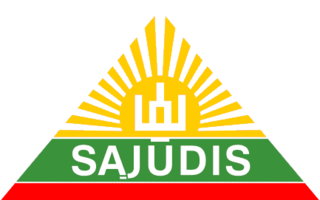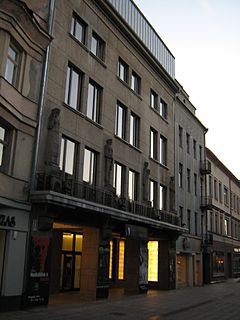
Kaunas is the second-largest city in Lithuania after Vilnius and an important centre of Lithuanian economic, academic, and cultural life. Kaunas was the biggest city and the centre of a county in the Duchy of Trakai of the Grand Duchy of Lithuania and Trakai Palatinate since 1413. In the Russian Empire, it was the capital of the Kaunas Governorate from 1843 to 1915.

Music of Lithuania refers to all forms of music associated with Lithuania, which has a long history of the folk, popular and classical musical development. Music was an important part of polytheistic, pre-Christian Lithuania – rituals were accompanied by music instruments and singing, deeds of the heroes and those who didn't return from the war were celebrated in songs.

Vytautas Magnus University (VMU) is a public university in Kaunas, Lithuania. The university was founded in 1922 during the interwar period as an alternate national university.

Antis is a Lithuanian postmodernist rock band.

Sąjūdis, initially known as the Reform Movement of Lithuania, is the political organisation which led the struggle for Lithuanian independence in the late 1980s and early 1990s. It was established on 3 June 1988, and was led by Vytautas Landsbergis. Its goal was to seek the return of independent status for Lithuania.
Rock music has been performed and heard in Lithuania since the mid-1960s. At first, repression by the Soviet authorities meant that rock was performed only at illegal gatherings, while music from the West was available on Radio Luxembourg or smuggled records. As pressure eased somewhat, rock musicals began to be released, such as Velnio nuotaka and Ugnies medžioklė su varovais.

The Lithuanian Riflemen's Union or LRU, also referred to as Šauliai, is a paramilitary non-profit organisation supported by the State. The activities are in three main areas: military training, sport and culture.
Algirdas Julien Greimas, was a Lithuanian literary scientist who wrote most of his body of work in French while living in France. Greimas is known among other things for the Greimas Square. He is, along with Roland Barthes, considered the most prominent of the French semioticians. With his training in structural linguistics, he added to the theory of signification, plastic semiotics, and laid the foundations for the Parisian school of semiotics. Among Greimas's major contributions to semiotics are the concepts of isotopy, the actantial model, the narrative program, and the semiotics of the natural world. He also researched Lithuanian mythology and Proto-Indo-European religion, and was influential in semiotic literary criticism.

Kaunas University of Technology is a public research university located in Kaunas, Lithuania.

The NationalKaunas Drama Theatre is the biggest theatre in Kaunas, and one of the oldest functioning theatres in Lithuania. There are six different creative spaces for events in the Kaunas Drama Theatre.
Daina Society was a Lithuanian cultural organization promoting Lithuanian folk traditions and songs. It was established as an illegal cultural society by the composer Juozas Naujalis and officially registered with the Tsarist authorities in 1905. Active from 1899 to 1944 in Kaunas, the society organized various events, concerts, amateur theater performances. In 1924, it initiated the first Lithuanian Song Festival.

The signatories of the Act of Independence of Lithuania were the twenty Lithuanian men who signed the Act of Independence of Lithuania on February 16, 1918. The signatories were elected to the Council of Lithuania by the Vilnius Conference in September 1917 and entrusted with the mission of establishing an independent Lithuanian state. The proclaimed independence was established only in late 1918, after Germany lost World War I and its troops retreated from Lithuanian territory. What followed was a long process of building the state, determining its borders, and gaining international diplomatic recognition. The signatories succeeded in their mission and independent Lithuania survived until the Soviet Union occupied the state on June 15, 1940.
Liudas Jakavičius-Grimalauskas was a famous Lithuanian pianist, composer and theatre director. He was son of the writer and banker and Liudvikas Jakavičius and of Honorata Grimalauskaitė-Jakavičienė, daughter of a Polish-Lithuanian Duke.

The Way of Courage is a populist political party in Lithuania. It was founded in 2012 and has an anti-corruption platform.

The Lithuanian Crusade was a series of economic Christian colonization campaigns by the Teutonic Order and the Livonian Order under the pretext of forcibly Christianizing the pagan Grand Duchy of Lithuania. The Livonian Order occupied Riga in 1202 and the Teutonic Order conquered Culmerland in the 1230s. They first conquered other neighboring Baltic tribes—Curonians, Semigallians, Latgalians, Selonians, and Old Prussians—in the Livonian Crusade and Prussian Crusade.

Pranas Puskunigis was a Lithuanian musician, one of the first and most influential proponents of kanklės. During his life, he taught about 120 people how to play kanklės and established several ensembles, one of which is still active. He laid the groundwork for kanklės education and adapted numerous folk and professional songs to the instrument, but did not attempt to modify its design.
Vytautas Landsbergis-Žemkalnis was a Lithuanian modernist architect most active in interwar Lithuania (1926–1939). He was the father of Vytautas Landsbergis, the first Lithuanian head of state after independence from the Soviet Union.
The Supreme Tribunal of Lithuania was the highest court in interwar Lithuania. Officially established in December 1918, the court held its first proceedings in August 1919. Initially, it served as an appeals court for cases first decided by the district courts. Its competency was steadily expanded to encompass cases referred from the Army Court in July 1919, cassation cases from the justices of the peace in June 1921, cases from the Klaipėda Region (Memelland) in 1923, and certain functions of an administrative court. The judicial reform in 1933 created a new appeals court leaving the Supreme Tribunal with functions of a court of cassation and an administrative court. Its main task was to interpret and consistently apply the laws. The tribunal handled some controversial high-profile cases, including the case of Prime Minister Augustinas Voldemaras and corruption cases of Prime Minister Vytautas Petrulis and Minister of Foreign Affairs Juozas Purickis. The court was abolished and replaced by the Supreme Court of the Lithuanian SSR in September 1940. The tribunal was briefly resurrected during the German occupation of Lithuania.

Vytautas Bulvičius was a Lithuanian military officer, major of the General Staff, and leader of the anti-Soviet Lithuanian Activist Front (LAF).














